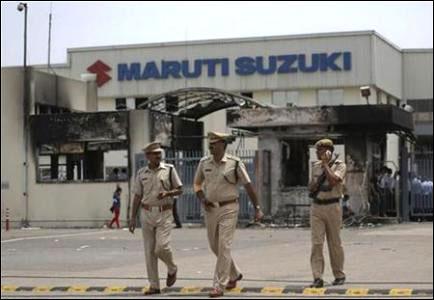 | « Back to article | Print this article |
Retrenchment or dismissal? Maruti action sparks debate
The dismissal of 546 permanent Maruti Suzuki workers on "disciplinary grounds'' has divided opinion if it was indeed a case of dismissals or if it was retrenchment. And, whether the distinction between the two has blurred.
While retrenchment of workers is possible under the Industrial Disputes Act, subject to the approval of the state government, dismissal is possible under the Industrial Employment Standing Orders Act, which does not require the state approval.
While some, including the company itself, see the dismissals as a case of disciplinary action under the Industrial Employment Standing Orders Act, others including trade unions and some academics see it as veiled retrenchment, which should be addressed under the Industrial Disputes Act.
Click on NEXT for more...
Retrenchment or dismissal? Maruti action sparks debate
Maruti COO Administration S Y Siddiqui says all legal processes were followed by the company.
He cites 33 summary dismissals under both the Industrial Disputes Act and the Standing Orders Act, and the dismissal of 513 others under the Standing Orders Act on grounds of loss of confidence.
While the management does not clarify further on the legal process, and whether state approval has been sought or received, the company in its dismissal letter issued to workers says it is disciplinary action.
Here, the clarity ends, says Tapan Sen, general secretary, Centre for Trade Unions. It is contradicted in the next part of the letter, which announces compensation for the 'dismissed' workers.
"The compensation is according to what is given to retrenched workers," says Sen.
Click on NEXT for more...
Retrenchment or dismissal? Maruti action sparks debate
Labour law expert Dr Prabhu Mahapatra, who teaches at Delhi University, calls it retrenchment and says the difference in the salaries paid to contract and permanent workers indicates the gains in dismissing permanent workers.
Another labour law academic, Dr Kamala Shankaran, also from the university, does not see the line between retrenchment and dismissal blurring.
"When we talk of retrenchment, it is about surplus staff, for which permission is required. In this case it was disciplinary action, for which the company needs to follow its own standing orders modelled after the Standing Orders Act'' she says.
"Had it been dismissal, the workers should have been chargesheeted and given an opportunity to defend themselves. Besides, while the police had named 55 in the FIR and arrested about 100, four times that number has been dismissed," says Sen.



